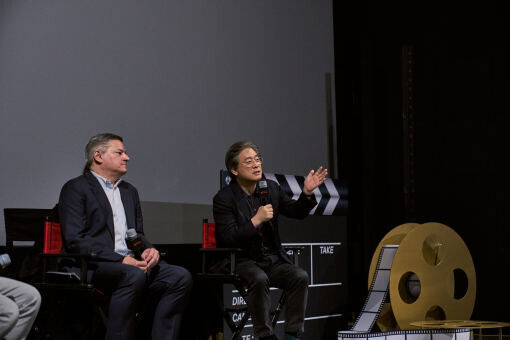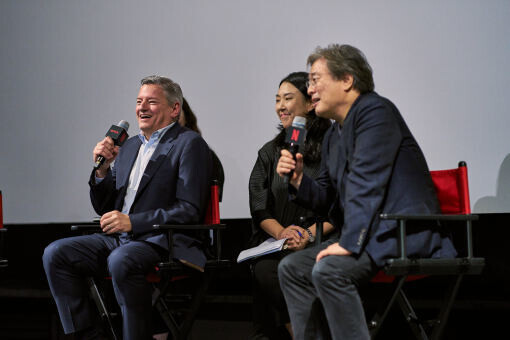hankyoreh
Links to other country sites 다른 나라 사이트 링크
In Korea, Netflix CEO boasts of platform’s freedoms, funding for storytellers

Netflix Co-CEO Ted Sarandos and Korean film director Park Chan-wook met with Korea’s future filmmakers on Wednesday afternoon at a screen named in Park’s honor at the CGV multiplex in Seoul’s Yongsan District. Sarandos and Park had a conversation with a hundred or so film students at the event.
“Netflix works with some of the great directors — like Park Chan-wook, who’s sitting with me today — but we try to bring more opportunities to new directors. In fact, one-fifth of all our original films are debut productions,” said Sarandos.
“This is the golden age of storytelling. I hope we’ll never stop thinking about which stories to tell, how to tell them, and who to tell them to.”
“I hope nobody tells HBO I’ve been attending a Netflix event instead of working on my editing,” Park joked after remarking that he’s supposed to be editing the miniseries “The Sympathizer,” which will be screened on US cable channel HBO.
Park has also been juggling production and scriptwriting responsibilities for “War and Revolt,” an original Netflix movie that recently began filming. “War and Revolt” stars Gang Dong-won and Park Jeong-min and is directed by Kim Sang-man.
“Since the miniseries is a historical martial arts story set during the Imjin War, a certain amount [of funding] is required. Our negotiations with Netflix went well, and we’ve been having a great time without any meddling from the studio [so far],” the director said.
“When we made our first investment in a Korean movie with ‘Okja’ in 2017, not just me but the whole world fell in love with Korean cinema. Nobody can hold a candle to the current level of the Korean film industry. Our original approach to producing content is giving talented storytellers the freedom to create and as much funding as possible,” Sarandos added.
Park and Sarandos had a similar experience with movies in their early years. Park and a friend ran a video rental store that went out of business, while Sarandos worked at a video rental store for a long time after dropping out of college. For Sarandos, that job helped him get involved in Netflix, which rented DVDs through the mail in its infancy.
“I had my first introduction to Korean films with ‘The Host’ by Bong Joon-ho in 2004, and I’ve sought out a lot of Korean movies since then,” Sarandos shared. “As that suggests, a good film is the first step on a long journey that connects you to other people.”

Park made a similar observation. “A good film is one that broadens our inevitably narrow personal experiences and ego and connects us to other people and other worlds. One of my favorite Netflix original films is ‘Roma.’ If not for that film, how else could I have felt like I was listening to someone talk about being a housekeeper in Mexico City in the 1970s? A good film is one that provides that kind of experience.”
What lies in store for cinema in a time of rapid technological change, when films can be shot and edited on a single smartphone and artificial intelligence is emerging as both a tool and agent of creation? “Things look very bright,” said Sarandos, expressing his optimism as a businessman.
“When I spoke on the phone with Guillermo del Toro during the pandemic, he told me that all he needed was food, water and a story. That indicates just how important storytelling is in our lives,” the Netflix executive remarked.
“Over time, storytellers keep getting more tools that can help them make the jump from good to great, and audiences keep getting more ways to enjoy stories. Netflix is working hard to bring better opportunities to both storytellers and audiences.”
“As a creator, I’m both scared and excited about rapid technological development,” Park remarked.
“We’ve entered an era where you can shoot a film and submit it for release on a smartphone, without any expensive cameras or professional technicians. Because nonprofessionals are capable of creating novel content with out-of-the-box thinking, the future of cinema will be moving in the direction of more diversity.”
“While it’s very convenient to have a greater range of options, I just wish people wouldn’t watch films on their smartphones. Even for me, that’s taking things too far,” said Park, somewhat wistfully.
When asked why Korean films have received so much attention in the global market, Park expressed reservations about the premise of the question because he thinks “the personality of individual filmmakers is more important than any national characteristics.”
“Koreans endured a bunch of painful historical episodes in a compact time frame — the Japanese colonial period, the Korean War, dictatorial regimes and the class struggle brought by industrialization. Koreans aren’t fazed by most stimuli, which, as I see it, has shaped the development of stimulating dramas,” he said.
“As [Korean filmmakers] try to pack a wide range of emotions, such as humor, sadness and fear, into a single film, the end result seems to not only stimulate but also touch upon universal human emotions.”
During the Q&A session, one of the students asked Sarandos what he thought was his best decision as CEO.
“I’d say it was our decision to make original TV series and films. Granted, that decision wasn’t voluntary because the studios were playing hardball on selling their best stuff. Still, launching that process has helped Netflix become not merely a platform, but a storyteller in its own right.”
By Kim Eun-hyoung, senior staff writer
Please direct questions or comments to [english@hani.co.kr]
Editorial・opinion
![[Column] Samsung’s ‘lost decade’ and Lee Jae-yong’s mismatched chopsticks [Column] Samsung’s ‘lost decade’ and Lee Jae-yong’s mismatched chopsticks](https://flexible.img.hani.co.kr/flexible/normal/500/300/imgdb/original/2024/0512/3017154788490114.jpg) [Column] Samsung’s ‘lost decade’ and Lee Jae-yong’s mismatched chopsticks
[Column] Samsung’s ‘lost decade’ and Lee Jae-yong’s mismatched chopsticks![[Correspondent’s column] The real reason the US is worried about Chinese ‘overcapacity’ [Correspondent’s column] The real reason the US is worried about Chinese ‘overcapacity’](https://flexible.img.hani.co.kr/flexible/normal/500/300/imgdb/original/2024/0510/5217153290112576.jpg) [Correspondent’s column] The real reason the US is worried about Chinese ‘overcapacity’
[Correspondent’s column] The real reason the US is worried about Chinese ‘overcapacity’- [Editorial] Yoon’s gesture at communication only highlights his reluctance to change
- [Editorial] Perilous stakes of Trump’s rhetoric around US troop pullout from Korea
- [Guest essay] Preventing Korean Peninsula from becoming front line of new cold war
- [Column] The state is back — but is it in business?
- [Column] Life on our Trisolaris
- [Editorial] Penalties for airing allegations against Korea’s first lady endanger free press
- [Editorial] Yoon must halt procurement of SM-3 interceptor missiles
- [Guest essay] Maybe Korea’s rapid population decline is an opportunity, not a crisis
Most viewed articles
- 1[Column] Samsung’s ‘lost decade’ and Lee Jae-yong’s mismatched chopsticks
- 2S. Korea “monitoring developments” after report of secret Chinese police station in Seoul
- 3Yoon rejects calls for special counsel probes into Marine’s death, first lady in long-awaited presse
- 4‘We must say no’: Seoul defense chief on Korean, USFK involvement in hypothetical Taiwan crisis
- 5Behind-the-times gender change regulations leave trans Koreans in the lurch
- 6Nuclear South Korea? The hidden implication of hints at US troop withdrawal
- 7Korea sees more deaths than births for 52nd consecutive month in February
- 8In Yoon’s Korea, a government ‘of, by and for prosecutors,’ says civic group
- 9Small businesses pushing for lower credit card fees
- 10[Column] “Hoesik” as ritual of hierarchical obedience